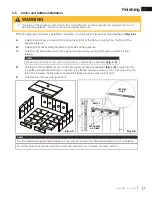
EN
W415-2797 / A / 01.31.20
11
3.0 installation
It is extremely important that your appliance be installed according to the manufacturer's specifi cations. The
manufacturer's installation instructions and specifi ed clearances should always be followed in accordance with
local and national codes. In Canada the CSA B365 and the CSA C22.1 installation codes are to be followed. In
the USA the ANSI NFPA 70 and ANSI NFPA 211 installation codes are to be followed.
Chimney and liner must be in good condition and kept clean.
!
WARNING
•
Wear gloves, protective footwear and safety glasses for protection.
•
Carefully follow the instructions for assembly of the pipe and other parts needed to install the appliance.
Failure to do so may result in a fi re, especially if combustibles are too close to the appliance or chimney and air
spacers are blocked, preventing the free movement of cooling air.
•
Do not draw outside air from garage spaces. Exhaust products of gasoline engines are hazardous. Do not
install outside air ducts such that the air may be drawn from attic spaces, basements or above the roofi ng
where other heating appliances or fans and chimneys exhaust or utilize air. These precautions will reduce the
possibility of appliance smoking or air fl ow reversal. The outside air inlet must remain clear of leaves, debris, ice
and/or snow. It must be unrestricted while appliance is in use to prevent room air starvation which can cause
smoke spillage and an inability to maintain a fi re. Smoke spillage can also set off smoke alarms.
•
Negative pressure within your home may inadvertently affect your appliance.
•
To prevent contact with sagging or loose insulation, the appliance must not be installed against vapour barriers
or exposed insulation. Localized overheating could occur and a fi re could result.
•
Do not use makeshift compromises during installation. Do not block or restrict air, grille or louvre openings. Do
not add a hood.
•
To prevent personal injury, keep hand tools in good condition, sharpen cutting edges and make sure tool
handles are secure.
•
Always maintain the minimum air space required in the enclosure to prevent fi res.
•
Check with local building offi cials for any permits required for installation of this appliance and notify your
insurance company prior to proceeding.












































